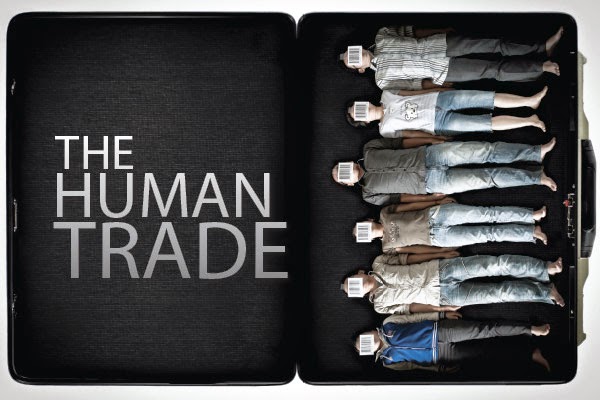What you might not have heard about human trafficking
Yesterday at a joint East Sac Chamber of Commerce and Rotary Club meeting, we heard from Ben Greer, a former member of the California Attorney General's office and a subject matter expert on human trafficking in California. I learned a few eye-opening things about trafficking, including one fact that shows where the glaring need is right now.
Human trafficking defined. To quote the 2012 CA Attorney General's report, "Human trafficking is a modern form of slavery. It involves controlling a person through force, fraud, or coercion to exploit the victim for forced labor, sexual exploitation, or both."
Americans being trafficked. One thing I didn't know is that whereas we tend to associate human trafficking with people coming in from other countries, evidence shows that 72% of trafficking victims in CA are Americans. This means a great number of American citizens are being lured and/or forced into positions of slavery. And as I understand it, the majority of those are children and youth. Adults enslaving children, right here among us -- that ought to make our blood boil.
Sex trafficking and labor trafficking. The two main forms modern slavery takes are sex trafficking and labor trafficking. Sex trafficking most commonly refers to various forms of prostitution. Labor trafficking is less obvious. It is "the act of forcing a person to work for little or no money. It can include forced labor in underground markets and sweatshops, as well as legitimate businesses such as hotels, factories, restaurants, construction sites, farming, landscaping, nail salons, and traveling sales crews" (CA Attorney General's report). In either sex or labor trafficking, it's the powerless being coerced by the powerful.
We are making progress. America is undergoing a massive shift in its attitude toward trafficking. As a theologian, I would say God has woken up our society. He is giving a voice to the ones who previously were voiceless. That's what God does. We see this in the form of numerous advocacy groups, new laws to make trafficking penalties more of a deterrent, and more specific training within law enforcement agencies. And let's not forget how God has stirred up his church. A decade ago, we heard little or nothing about human trafficking in churches. Now it is a common point of awareness and action.
The glaring need. Good things are happening, but there is a gaping hole in our response to trafficking. In America, we are paying a lot of attention to sex trafficking, and for good reason. There's nothing more stomach-turning than the thought of an 11-14 year old girl being manipulated, threatened, and essentially brainwashed to become a sex slave for adult men. That is is a common scenario, and it's going on in every city in America right now.
However, here's a fact that really got my attention. Whereas sex trafficking currently gets the most press, labor trafficking is far more common. Globally, labor trafficking is 3.5 times more prevalent than sex trafficking. You know who the voiceless ones are in America right now? Victims of labor trafficking.
Here's an example of what labor trafficking can look like. It's an actual case, as described in the CA Attorney General's report:
Note: Some additional info about California and Sacramento. California ranks fourth in American states for volume of trafficking. CA has three of the top five cities nationwide for trafficking. It is a populous state with several means of entry (plane, boat, car, train, etc.), so traffickers bringing victims into the US commonly route through CA. As for Sacramento, I had heard a while back that our city is the fourth busiest trafficking hub in the United States. Greer said that all depends on how you measure things. But he confirmed that there is a string of cities that traffickers and victims cycle through, making money and moving on to the next stop. The cities include Los Angeles, Las Vegas, Reno, Sacramento, and San Francisco. There are one or two more, but I don't remember what they are. Needless to say, Sacramento is a very busy city for trafficking.
Human trafficking defined. To quote the 2012 CA Attorney General's report, "Human trafficking is a modern form of slavery. It involves controlling a person through force, fraud, or coercion to exploit the victim for forced labor, sexual exploitation, or both."
Americans being trafficked. One thing I didn't know is that whereas we tend to associate human trafficking with people coming in from other countries, evidence shows that 72% of trafficking victims in CA are Americans. This means a great number of American citizens are being lured and/or forced into positions of slavery. And as I understand it, the majority of those are children and youth. Adults enslaving children, right here among us -- that ought to make our blood boil.
Sex trafficking and labor trafficking. The two main forms modern slavery takes are sex trafficking and labor trafficking. Sex trafficking most commonly refers to various forms of prostitution. Labor trafficking is less obvious. It is "the act of forcing a person to work for little or no money. It can include forced labor in underground markets and sweatshops, as well as legitimate businesses such as hotels, factories, restaurants, construction sites, farming, landscaping, nail salons, and traveling sales crews" (CA Attorney General's report). In either sex or labor trafficking, it's the powerless being coerced by the powerful.
We are making progress. America is undergoing a massive shift in its attitude toward trafficking. As a theologian, I would say God has woken up our society. He is giving a voice to the ones who previously were voiceless. That's what God does. We see this in the form of numerous advocacy groups, new laws to make trafficking penalties more of a deterrent, and more specific training within law enforcement agencies. And let's not forget how God has stirred up his church. A decade ago, we heard little or nothing about human trafficking in churches. Now it is a common point of awareness and action.
The glaring need. Good things are happening, but there is a gaping hole in our response to trafficking. In America, we are paying a lot of attention to sex trafficking, and for good reason. There's nothing more stomach-turning than the thought of an 11-14 year old girl being manipulated, threatened, and essentially brainwashed to become a sex slave for adult men. That is is a common scenario, and it's going on in every city in America right now.
However, here's a fact that really got my attention. Whereas sex trafficking currently gets the most press, labor trafficking is far more common. Globally, labor trafficking is 3.5 times more prevalent than sex trafficking. You know who the voiceless ones are in America right now? Victims of labor trafficking.
Here's an example of what labor trafficking can look like. It's an actual case, as described in the CA Attorney General's report:
Working with a co-conspirator in the Philippines, a Paso Robles couple lured victims to the United States with the promise of good jobs. After arriving in this country, the victims worked in one of the couple’s four elder care facilities – often on 24-hour-shifts. They were paid less than minimum wage and told they needed to pay off their “debt” to the traffickers. The victims slept on sofas, and in closets and an unheated garage, and were kept in line with threats of phone calls to the police or immigration authorities. After an observant and concerned member of the community reached out to law enforcement, the victims were rescued. In 2012, the labor traffickers were sentenced to 18 months in federal prison.Only 18 months! For enslaving people! Slap-on-the-wrist penalties like this are one of the things that are changing in CA.
But my point today is this: I asked Greer who is being overlooked. He replied that it's victims of labor trafficking. To be more specific, it's boys under 18 who have no place to go if they are liberated from forced labor. Who is speaking up for these boys?
Along with a fact like this comes an obvious question: what might God want us to do about labor trafficking? For me, I am going to investigate the issue further, pray, and discern if this is where God wants me/us/our church to get involved.
How about you?
Note: Some additional info about California and Sacramento. California ranks fourth in American states for volume of trafficking. CA has three of the top five cities nationwide for trafficking. It is a populous state with several means of entry (plane, boat, car, train, etc.), so traffickers bringing victims into the US commonly route through CA. As for Sacramento, I had heard a while back that our city is the fourth busiest trafficking hub in the United States. Greer said that all depends on how you measure things. But he confirmed that there is a string of cities that traffickers and victims cycle through, making money and moving on to the next stop. The cities include Los Angeles, Las Vegas, Reno, Sacramento, and San Francisco. There are one or two more, but I don't remember what they are. Needless to say, Sacramento is a very busy city for trafficking.






Comments
Post a Comment